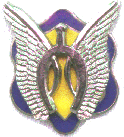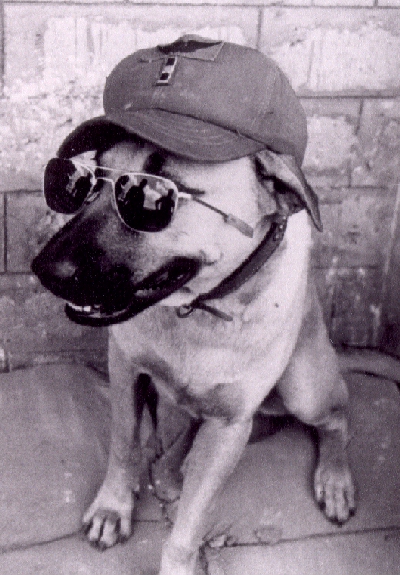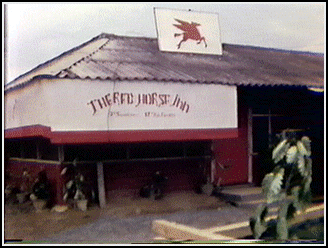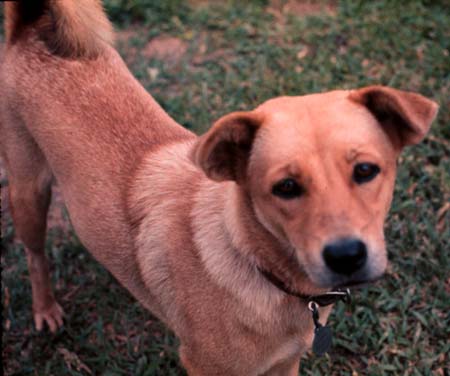


Silver Spurs
A Troop, 3/17th Air Cav Troop History
The Dog Who Flew With Silver Spurs
by William L. McCalister, Jr.
1970

Spur mascot, "Wopa" in full dress uniform!
Wopa often flew with the Lift & Rifle platoons.
Courtesy of Bill McCalister
The Red Horse Inn was an oasis for the combat weary troopers of the 3d Squadron, 17th Air Cavalry in Vietnam. It was a simple structure of plywood that had a large screened patio with a tin roof that rattled noisily when it rained. Above the entrance was a large sign painted with a bright red Pegasus. The men of the squadron built it in their spare time with "scrounged" material, and it was their special place for relaxation, for refreshment, and, occasionally, for revelry. It was once also the scene of a ludicrous controversy created by intense emotions among the squadron pilots concerning an intrepid canine named Wopa!

The Redhorse Inn
Courtesy of Tom White
The story begins back in January 1969 at the Di An Base Camp, located in the brush country about ten miles northwest of Saigon. Particularly, this was the home for Troop A of the squadron, more widely known and acclaimed by their radio call sign, "Silver Spurs."
I was a Lieutenant just recently graduated from the U.S. Army Helicopter Training Program. After arriving in Vietnam, I was subsequently assigned to Troop A for my tour of combat duty. I came to Di An in the early afternoon on January 19, and was given the customary orientations at the squadron and troop headquarters. Afterwards, I was filled with imaginative anticipation of the forthcoming combat with the "Silver Spurs."
The troop area was nearly vacant this time of the day due to mission requirements. I went to my assigned "hooch"; and while unpacking my gear, I suddenly noticed a skinny, mongrel dog sharing the quarters. He had been sleeping beneath the small frame bed and raised his head to stare at me as I invaded his privacy. Closer scrutiny revealed symptoms of malnutrition and acute companionship-anemia. So, following the evening meal, I brought him some table scraps from the mess hall. That first expression of kindness quickly paved the way to a steadfast friendship.
I believe that every animal, like humans, possesses a unique personality and temperament. It has been said that the most common emotional ailment that permeates all of dogdom is the delusion that they are four legged people! Wopa was no exception.
His name, Wopa, is synonymous with the acronym for an unofficial U.S. Army organization known as the Warrant Officers Protective Association. It has an "unwritten" constitution and consists of a strongly knit group of Warrant Officers dedicated to their profession. Wopa's name is a tribute to the multitude of valiant Warrant Officer pilots that comprise the backbone of the U.S. Army Aviation efforts in Southeast Asia.
Besides this canine's unique name, there were several physical ingredients of character that manifested themselves as our friendship ripened. He was medium-sized in build, with hair shaded like bleached straw. His appearance was enhanced by a wrinkled forehead, which gave him a most profound countenance and peculiar stare. His tail arched up and back over his body somewhat like a horseshoe, usually resting in a half-cocked position to one side. He sometimes ambled along using only three legs as his hind legs were plagued by arthritis resulting from an accident at Long Binh, where he was struck by a jeep.

Wopa - Courtesy of Charles Womble
Besides his physical traits, Wopa possessed a nebulous charisma in his personality, attested to by his intrinsic talents for adventure and challenge.
Now, in Vietnam, "man's best friend" has been accepted as an extension of the soldier's natural senses with extensive programs devised to educate the sentry, scout, tracker and even tunnel and booby-trap detecting dogs. Many accounts relate the invaluable services provided by these trained canines. In fact, the U.S. Army is now experimenting with a new "super breed" of dogs for future combat requirements. Wopa did not fit any of these categories; instead, he will be remembered in the annals of dogdom for his exploits and achievements as a Flying Mascot.
Prior to my arrival in the troop, Wopa had belonged to a Warrant Officer in the lift section of the aero-rifle platoon. After a few days' acquaintance, our mutual adoption cemented our relationship and Wopa began accompanying me everywhere in the troop area. Day by day, we progressively developed into inseparable companions. On a typical day, Wopa would rise at dawn and accompany me to breakfast and then to the Flight Operations Room. There, he would watch as I departed for my helicopter at Sabre Heliport. Wopa patiently waited in the shade of a bunker and would greet me with his particular display of affection when I returned from the day's mission.
Sometimes, following the evening meal, the platoon would play a wild game of "Jungle Volleyball" and Wopa would watch intently from the sidelines. After the game, he would nonchalantly follow the players as they adjourned to relax in the squadron officers club, the Red Horse Inn. Considering himself "one of the boys," Wopa enjoyed the fraternizing and the tidbits he might wheedle from the men. At taps, he would escort me safely back to our hooch; and during the night, I slept contentedly with Wopa beneath my bunk as guardian. Often, he would make his presence known by nudging my hand reassuringly when returning from any night prowling!
During late March, a significant event transpired that caused our relationship to ripen even further. Living in such close proximity, it was quite natural that several of the other men also developed an attachment for Wopa. Two of them were my constant companions, Lieutenant Mike Reardon, a Vermont Yankee, and Lieutenant Dick "Mac" McCulloch, an Alabama farm boy. They both encouraged Wopa to follow the pilot's truck over to Sabre Heliport one morning. The distance was more than a country mile, but Wopa managed to keep the truck in sight all the way and was apparently thrilled with his new discovery. Henceforth, he came to Sabre daily, waited until mission departure time, then returned to the Flight Operations room for his usual daily vigil.
Inevitably, Wopa was destined for adventure in a realm remote from his wildest imaginations. About a week after Wopa's first visit to Sabre, my crew chief, PFC Mike Scott, suggested that Wopa be brought along during a mission. Scotty was the most daring crew chief in the troop, and the keeper of Hawk, Wopa's father. Against my arguments, Scotty persisted that Wopa did not appear to fear hovering aircraft like other mascots and that he would not interfere with the mission performance. Scotty stressed the fact that this would be "status" for the aero-rifle platoon. I was skeptical. The idea of a pet flying in the aircraft had not been a previous practice by Troop A; and besides, Wopa might become frightened and fall from the aircraft.
Mike, Mac and I discussed the proposal that evening. Carefully weighing the factors, we made our surreptitious decision. At the moment, it seemed rather quixotic. Wopa experienced his first sensation of flight during a routine combat support mission from Di An to Lai Khe. He adapted to the new environment with ease. Although his mannerisms expressed great anxiety during the take-offs, once airborne, he was calmed and seemed to sense his new accomplishment. Relishing the flow of cool air through the open doors, he strutted from side to side of the cargo compartment gazing at the new view of his old world, then he curled up next to the transmission fire wall and slept!
My fears were gone. Considering the apparent initial success, I decided that Wopa should participate in an actual combat assault mission, just as the aero-rifle platoon had frequently used their tracker dog on combat assaults. However, I was uncertain of Wopa's reaction to other troops being on board, not to mention the sights and sounds of exploding rockets and crackling mini-gun bursts that would be used in the devastating suppressive fire during the assault. After all, a tracker dog was well disciplined for this duty, while Wopa was still a combat virgin. As might be expected from a dog of such character, he reacted like a seasoned veteran!
While enroute to the landing zone, Wopa circulated among the cavalrymen in the helicopter as if he were wishing them all "good luck!" He seemed to sense the tenseness and excitement of the moment. During the actual assault, the crisp staccato of the M-60 machine guns firing intensified his exhilaration. Wopa moved forward to the cockpit pedestal between the pilot and copilot seats which afforded him a better view of the action. Upon landing, the troops dispersed from the helicopter to perform their mission.
When the troops were ready for pick up, Wopa served as their welcoming host while they clambered aboard. His services were rather limited, but I did see some wide smiles from weary faces thanking Wopa for his welcome!
Since Wopa's inaugural combat assault mission had been a success, the platoon decided to continue this canine aerial experiment. Wopa gradually became the object of a growing community of admirers. Although his aerial actions were clandestine, they nevertheless became well known throughout the platoon. Actually, Wopa began to anticipate flying daily missions with me. His anticipation became so intense that on numerous occasions, if I failed to place him aboard before hovering for take-off, he would race ahead of the helicopter, jumping up and down pleading to be taken aboard!
Our joint aerial endeavor continued smoothly for almost two months. Then, one evening in late May, as the platoon returned from its mission and began disembarking from the truck, I was approached by my section leader, Captain James Le Duc. He had not flown with us that day; and as the truck neared Flight Operations, I noticed him standing there with Warrant Officer Shakallis, our Instructor Pilot. Both were scowling very hard. The Captain approached me slowly, placed his arm around my shoulder and said rather ominously, "The Old Man has learned about Wopa being in your aircraft and wants to see you first thing in the morning." His tone was not pleasant.
As he walked away, a myriad of' thoughts flashed across my mind, conjuring up all sorts of punishments for my actions. Who had revealed our secret? Only the platoon knew about Wopa. Immediately, a cloud of gloom hovered above me, and I avoided everyone for the rest of the day. I even abstained from the club that night, and the usual din and chatter drifting into my hooch from the fellows at the Red Horse Inn accentuated my melancholy outlook. Even Wopa lay silent beneath my bunk.
Early the next morning, I reported to the Orderly Room, where I sat for thirty minutes silently contemplating my mock execution. Our Commanding Officer was Major Burnett Sanders, an accomplished combat veteran, one of the innovators of the air cavalry concept, and a disciplinary martinet. The idea of confronting him at that early hour was certainly not appetizing!
Just then, the office door opened and the First Sergeant motioned for me to enter. I felt queasy. Major Sanders returned my salute, then asked: "Are you aware of your rights under Article 31 of the Uniform Code of Military Justice?" I was stunned. Informing me that he was cognizant of my airborne actions with Wopa, he then asked if I could justify those actions. I began to flounder for words, then stammered out two rather facetious reasons. An eternity elapsed, filled only by morbid silence. I was definitely up the proverbial creek!
The silence terminated with the opening of the rear office door. In walked Captain Bell, the troop Executive Officer, grinning like an ear of corn, and leading Wopa with a rope leash! Behind Captain Bell came the Adjutant; and by then, I could discern a group of the platoon members waiting just outside the open door. Major Sanders muffled a laugh. 1 realized immediately that my punishment was really a hoax; and to my surprise, Wopa was about to be rewarded for his services rather than being chastised!
I was tingling with excitement as Major Sanders pinned an Air Medal to Wopa's collar and officially declared him Troop Mascot! The Adjutant read the citation, which ended with: "For meritorious service and achievement while serving in the capacity of official Troop A Mascot." Flushed with elation, I led Wopa from the room. Outside, the men of the platoon greeted us with a happy mixture of grinning, laughing and congratulations! The platoon had really fooled me. To this day, I have no idea who divulged the secret of Wopa to Major Sanders or who planned the award ceremony. The honor and distinction of being awarded the Air Medal was the highlight of our aerial experiment.
But these honors were short lived. Despite his place of honor within Troop A, Wopa was not popular with everyone within the entire squadron. It was just three months after this day of distinction, that Wopa became the object of a heated campaign to remove his club privileges in the Red Horse Inn.
The commander of Troop C was a rotund short Oklahoman whose own mascot was not permitted to enter the club. Since I am a lanky Texan, there was a natural geographic rivalry that existed between us during our association. Each of the troops in the squadron had mascots; however, Wopa was the only mascot enjoying "club privileges" so to speak. During mid-August, this troop commander began making an issue of Wopa being allowed in the club. At first, this seemed to be a jocular opinion, but it soon progressed to a point where adamant feelings developed for and against Wopa. Coalitions between the troops were formed, with most of Troop A backing Wopa's admittance to the club and most of Troop C being against his admittance.
Relations eventually became so hostile, that Troop C boycotted the club and the Squadron Commander was forced to call a general meeting of the membership to settle this now serious issue. Animosity filled the air during the meeting. After hearing the opinions and plaudits of both sides, the Squadron Commander asked that a vote be taken, and the tally revealed that Wopa could no longer enter the club! The conflict was settled, but Wopa's wounded pride healed slowly.
During the remainder of the year, Wopa continued his flying exploits; and at night, he faithfully waited outside the club entrance for my reappearance.
It is difficult to measure a dog's loyalty; but once while I went away to Soc Trang on a special mission, Wopa awaited my return for three days in my revetment at Sabre heliport until he was finally coaxed to return to the troop area by the troop maintenance officer.
Obviously, the termination of our companionship at the end of my tour was an unpleasant task. The morning I departed Di An, Wopa followed, as usual, right up to the helicopter. I gave him a final hug and leaped aboard without him. A sad glint was reflected in his eyes as he stared at the departing helicopter. I knew he did not understand.
Wopa's flying career was terminated when I left Di An, but letters from some of the remaining troopers report that he is still active as their mascot and is now cared for by the troop maintenance officer. During that year with me, Wopa logged almost two hundred hours of mascot flight time! He participated on numerous missions, exhibiting the daring and courage of the men with whom he flew. Although he was not a trained canine specialist, to the men of the "Silver Spurs" he was a loyal trooper who had justly "earned his spurs."
I suspect that he will continue to be an institution in the troop until it is returned to the United States. Then, he will be forced to surrender his attachment to the air cavalrymen of Troop A. I anticipate that this separation will not be easy. In fact, a return to his normal life may well be an impossibility. In this sense, Wopa symbolizes the Vietnamese people. In my mind's eye, I can visualize a future dramatic scene at the sprawling Bien Hoa Air Base, wherein as the final soldier begins to board the last "Freedom Bird," Wopa will be impeding his progress by desperately clinging to his pant leg!

© William L. McCalister, Jr. - 1970